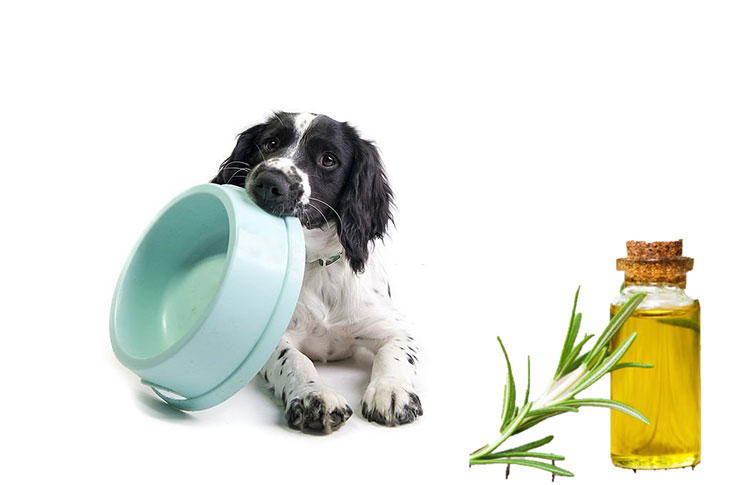Can dogs eat rosemary extract? Curious about its effects on your canine companions?
As a responsible pet owner, it’s important to consider the safety and potential benefits of the foods and supplements you offer the dogs.
I will explore whether dogs can safely consume this herb and the factors to consider when adding it to their diet.
Can Dogs Eat Rosemary Extract?

Fortunately, dogs can consume rosemary extract safely, at least in moderation. According to the ASPCA, fresh or dried rosemary is not hazardous to dogs, cats, or horses.
But it’s unsafe for canines to consume huge amounts of the herb, as it might cause indigestion and upset stomach.
What Is Rosemary Extract?
Rosemary extract is a concentrated form of the rosemary plant. It is commonly used as a flavoring agent in various culinary dishes and is also found in some natural remedies and pet products.
The extract is derived by steeping rosemary leaves in a solvent, which helps to extract the active compounds and essential oils present in the herb.
Recommended Dosage For Dogs
Is rosemary safe for dogs? Yes, but in moderation.
The recommended dosage of rosemary extract for dogs can vary depending on factors such as the dog’s size, overall health, and any existing medical conditions.
It is always best to consult with your veterinarian for specific dosage recommendations tailored to your dog’s needs.
However, as a general guideline, a starting point is typically 1/8 to 1/4 teaspoon of rosemary extract per day for small to medium-sized dogs.
For larger dogs, the dosage can range from 1/4 to 1/2 teaspoon per day.
Notice to avoid giving this substance to your puppies, as it can cause yellow diarrhea.
Why Is Rosemary Extract In Dog Food, Is There Any Benefits?

Derived from the aromatic rosemary plant, this natural extract is more than just a flavoring agent. It offers a range of benefits for dogs, making it a valuable addition to their diet.
Antimicrobial
Rosemary extract contains compounds with antimicrobial properties, such as rosmarinic acid and carnosic acid.
These compounds help combat harmful bacteria, viruses, and fungi that may affect a dog’s immune system and overall health.
By including this natural preservative ingredient in the products, dog food manufacturers aim to enhance the food’s safety and reduce the risk of microbial contamination.
Antioxidant
Antioxidants play a vital role in neutralizing harmful free radicals in the body, protecting cells from oxidative stress.
Rosemary oil extract is rich in antioxidant properties like rosmarinic acid and flavonoids.
This helps support the immune system and defend against cell damage. It contributes to your furry friend’s overall well-being and may aid in reducing the risk of chronic diseases.
Bug Repellent
Another benefit of rosemary extract in dog food is its natural bug-repellent properties.
The aroma of this natural substance acts as a deterrent to fleas, ticks, and other pests that can cause discomfort and transmit diseases to dogs.
While it’s not a substitute for specific flea and tick prevention methods, it may provide an additional layer of protection against these pests.
Digestive Health
Rosemary extract has been associated with promoting digestive health in dogs.
It contains compounds that stimulate the production of digestive enzymes, aiding in the breakdown and absorption of nutrients.
This can be particularly beneficial for dogs with sensitive stomachs or those prone to digestive issues.
How To Safely Feed Your Dog Rosemary Extract

Can dogs have rosemary extract? You can give your furry friends this supplement, but there are a few guidelines to follow to keep them safe and sound.
Consult your vet
Prior to including any new supplement or evergreen herb, like rosemary extract, in your dog’s diet, it’s essential to consult with your veterinarian.
They can offer personalized advice based on your dog’s specific health needs, breed, age, and any existing medical conditions.
Choose the right form
Use rosemary leaf extract specifically labeled for culinary or dietary use. Avoid concentrated forms like rosemary essential oil, as it can be toxic to dogs if ingested in large quantities.
Start with small amounts
Begin by introducing very small amounts of rosemary extract into your dog’s diet.
Also, check for any adverse effects, such as gastrointestinal upset or allergic reactions such as tearing-up. You can gradually increase the amount over time if no negative reactions occur.
Incorporate into food
Mix a small amount of fresh rosemary extract with the regular pet food or treats.
This helps distribute the extract evenly and makes it more palatable for your dog. Avoid feeding this natural ingredient alone or in large quantities.
Monitor the dog’s response
Observe your dog closely after introducing rosemary extract into their diet. Look for any changes in behavior, appetite, or overall health.
When you spot any negative reactions, like allergic symptoms, vomiting, diarrhea, etc., stop using it and ask for help from your vet.
Frequently Asked Questions
Is Rosemary Extract Safe For Dogs’ Skin?
Yes, rosemary extract is generally safe for your dog‘s skin.
Still, you need to dilute it properly before using it topically and avoid using concentrated forms like essential oils, as they can be too strong for a dog and cause skin irritations.
Consult a professional groomer for specific guidance, especially if your dog has any pre-existing skin conditions or sensitivities.
Can Dogs Eat Turkey With Rosemary Extract?
Yes, dogs can eat turkey that has been seasoned with rosemary extract. The combination of rosemary leaf and turkey can provide a natural and tasty boost to the animal’s meals.
Notice to use the supplement in moderation, and everything will be fine.
What Other Non-Toxic Herbs Or Green Are Safe For Dogs To Eat?
Some commonly safe options include parsley, basil, thyme, oregano, sage, dill, cilantro, spinach, kale, and broccoli.
Keep in mind to do research and talk to your veterinarian before introducing any new herbs or greens into your dog’s current diet.
This way, you can ensure they are suitable for your specific dog and avoid any unwanted negative side effects.
The Bottom Line
Can dogs eat rosemary extract? The short answer is yes! Fortunately, dogs can safely consume this herbal supplement and get many health benefits from it when used appropriately.
Still, talk to your veterinarian first to ensure proper dosage and address any individual sensitivities.
